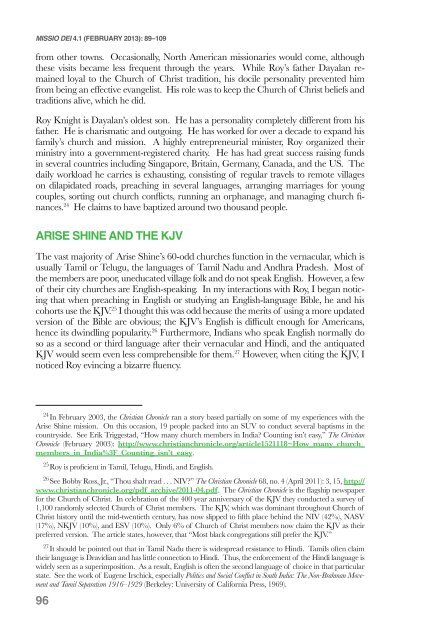VULNERABLE MISSION
VULNERABLE MISSION
VULNERABLE MISSION
Create successful ePaper yourself
Turn your PDF publications into a flip-book with our unique Google optimized e-Paper software.
MISSIO DEI 4.1 (FEBRUARY 2013): 89–109<br />
from other towns. Occasionally, North American missionaries would come, although<br />
these visits became less frequent through the years. While Roy’s father Dayalan remained<br />
loyal to the Church of Christ tradition, his docile personality prevented him<br />
from being an effective evangelist. His role was to keep the Church of Christ beliefs and<br />
traditions alive, which he did.<br />
Roy Knight is Dayalan’s oldest son. He has a personality completely different from his<br />
father. He is charismatic and outgoing. He has worked for over a decade to expand his<br />
family’s church and mission. A highly entrepreneurial minister, Roy organized their<br />
ministry into a government-registered charity. He has had great success raising funds<br />
in several countries including Singapore, Britain, Germany, Canada, and the US. The<br />
daily workload he carries is exhausting, consisting of regular travels to remote villages<br />
on dilapidated roads, preaching in several languages, arranging marriages for young<br />
couples, sorting out church conflicts, running an orphanage, and managing church finances.<br />
24 He claims to have baptized around two thousand people.<br />
ARISE SHINE AND THE KJV<br />
The vast majority of Arise Shine’s 60-odd churches function in the vernacular, which is<br />
usually Tamil or Telugu, the languages of Tamil Nadu and Andhra Pradesh. Most of<br />
the members are poor, uneducated village folk and do not speak English. However, a few<br />
of their city churches are English-speaking. In my interactions with Roy, I began noticing<br />
that when preaching in English or studying an English-language Bible, he and his<br />
cohorts use the KJV. 25 I thought this was odd because the merits of using a more updated<br />
version of the Bible are obvious; the KJV’s English is difficult enough for Americans,<br />
hence its dwindling popularity. 26 Furthermore, Indians who speak English normally do<br />
so as a second or third language after their vernacular and Hindi, and the antiquated<br />
KJV would seem even less comprehensible for them. 27 However, when citing the KJV, I<br />
noticed Roy evincing a bizarre fluency.<br />
24 In February 2003, the Christian Chronicle ran a story based partially on some of my experiences with the<br />
Arise Shine mission. On this occasion, 19 people packed into an SUV to conduct several baptisms in the<br />
countryside. See Erik Triggestad, “How many church members in India? Counting isn’t easy,” The Christian<br />
Chronicle (February 2003): http://www.christianchronicle.org/article1521118~How_many_church_<br />
members_in_India%3F_Counting_isn’t_easy.<br />
96<br />
25 Roy is proficient in Tamil, Telugu, Hindi, and English.<br />
26 See Bobby Ross, Jr., “Thou shalt read . . . NIV?” The Christian Chronicle 68, no. 4 (April 2011): 3, 15, http://<br />
www.christianchronicle.org/pdf_archive/2011-04.pdf. The Christian Chronicle is the flagship newspaper<br />
for the Church of Christ. In celebration of the 400 year anniversary of the KJV they conducted a survey of<br />
1,100 randomly selected Church of Christ members. The KJV, which was dominant throughout Church of<br />
Christ history until the mid-twentieth century, has now slipped to fifth place behind the NIV (42%), NASV<br />
(17%), NKJV (10%), and ESV (10%). Only 6% of Church of Christ members now claim the KJV as their<br />
preferred version. The article states, however, that “Most black congregations still prefer the KJV.”<br />
27 It should be pointed out that in Tamil Nadu there is widespread resistance to Hindi. Tamils often claim<br />
their language is Dravidian and has little connection to Hindi. Thus, the enforcement of the Hindi language is<br />
widely seen as a superimposition. As a result, English is often the second language of choice in that particular<br />
state. See the work of Eugene Irschick, especially Politics and Social Conflict in South India: The Non-Brahman Movement<br />
and Tamil Separatism 1916–1929 (Berkeley: University of California Press, 1969).


